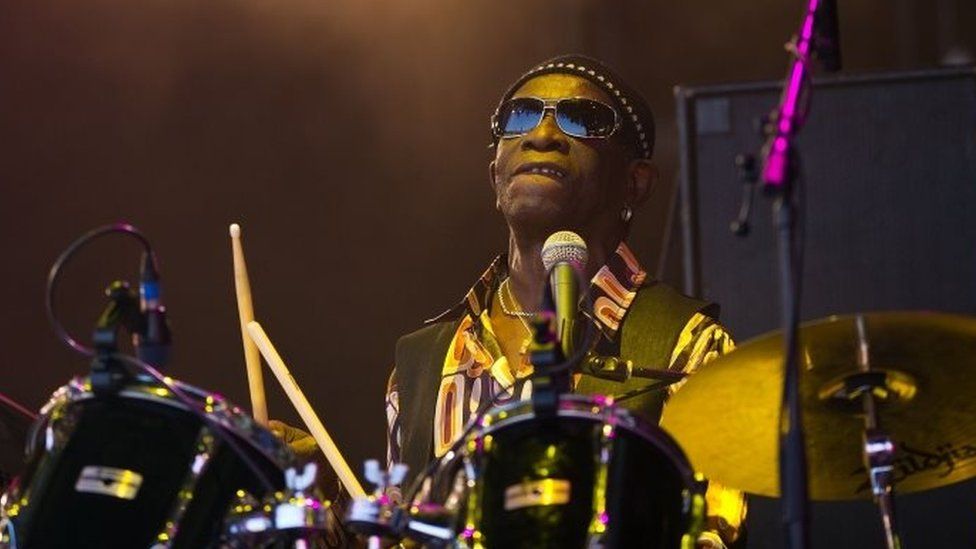Tony Allen: 'World's greatest drummer' and afrobeat pioneer dies
- Published

Pioneering Nigerian drummer Tony Allen, a co-founder of the afrobeat musical genre, died in Paris on Thursday aged 79, his manager says.
Eric Trosset told NPR radio that he had died of a heart attack. AFP said his death was not linked to coronavirus.
Allen was the drummer and musical director of musician Fela Kuti's famous band Africa '70 in the 1960-70s.
Fela, as he was widely known, died in 1997. He once said that "without Tony Allen, there would be no afrobeat".
Afrobeat combines elements of West Africa's fuji music and highlife styles with American funk and jazz.
Afrobeat drummer Tony Allen on learning to drum, working with Fela Kuti and Damon Albarn.
World stars pay their tributes
Allen has also been described by UK musician Brian Eno as "perhaps the greatest drummer who has ever lived".
Trosset led tributes in a Facebook post saying "your eyes saw what most couldn't see... as you used to say: 'There is no end'".
Beninois singer Angelique Kidjo told the BBC's Newsday programme that she had been hit hard by both Allen's death and the passing of Cameroonian saxophone legend Manu Dibango in March.
"What I want to remember from them is our musical conversation, our laughter, our joy. They are gone, but they are not gone for me," she said.
Allow Instagram content?
This article contains content provided by Instagram. We ask for your permission before anything is loaded, as they may be using cookies and other technologies. You may want to read Meta’s Instagram cookie policy, external and privacy policy, external before accepting. To view this content choose ‘accept and continue’.
On Instagram, she said that Allen had "changed the history of African music".
Ghanaian rapper M.anifest tweeted that Allen "put the beat in afrobeat" and thanked him "for a lifetime of being quietly epic".
Allow Twitter content?
This article contains content provided by Twitter. We ask for your permission before anything is loaded, as they may be using cookies and other technologies. You may want to read Twitter’s cookie policy, external and privacy policy, external before accepting. To view this content choose ‘accept and continue’.
Flea, the bassist for the Red Hot Chilli Peppers, who spent time with Allen in London, called him "one of the greatest drummers to ever walk this earth" and described him as his "hero".
"What a wildman, with a massive, kind and free heart and the deepest one-of-a-kind groove," Flea said on Instagram.
One of Fela's sons, musician Seun Kuti, tweeted "rest in power and journey well".
Who was Tony Allen?
Allen's career and life story were documented in his 2013 autobiography Tony Allen: Master Drummer of Afrobeat.
Allen, who was born in Lagos in 1940, taught himself how to play drums when he was 18.
He said he learnt his technique by listening closely to American jazz drummers Art Blakey and Max Roach. He then created the distinctive polyphonic rhythms of afrobeat and was said to be able to play four different beats with each of his limbs.
How Fela Kuti's legacy and music lives on
Allen first met Fela in 1964, and they went on to record dozens of albums in Africa '70, including Gentleman and Zombie.
Allen left the band in 1979, after reported rifts with the band leader over royalties. Fela needed four separate drummers to fill the void.
Allen emigrated to London in 1984, and later moved to Paris.
He collaborated with a number of artists during his long music career, and was the drummer in The Good, the Bad & the Queen, with Damon Albarn, Paul Simenon and Simon Tong.
An instantly recognisable sound
By Will Ross, former BBC Nigeria correspondent (and afrobeat aficionado)
There is a beautiful bounce to Tony Allen's drumming style that makes any track he played on instantly recognisable.
That's not to say he stood still. He was forever learning, forging new musical relationships and evolving his sound.
The combination of the bass, snare and hi-hat is uniquely Tony Allen-flavoured, whether you are listening to him as the driving force behind Fela Kuti's band in the 1970s, on his own hypnotic 1999 album Black Voices or playing live last year alongside Damon Albarn with The Good, The Bad and the Queen.
He once said Art Blakey must have been a magician because it sounded like more than one person was sitting behind the kit.
I recently got right up close to the stage to study the flow of Tony Allen's hands and feet. I was mesmerised by HIS magic.
He didn't seem to age much and looked set to keep drumming for many more years.
As he put it: "I'm looking forward to the future because it's a long, long way to go. There's no end. I'm very sure of that."
- Published21 March 2020
- Published28 March 2020